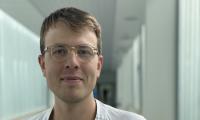Kristoffer Grundtvig Skaarup
For research in detection of early signs of heart disease
Kristoffer Grundtvig Skaarup has been awarded the Lundbeck Foundation’s Talent Prize 2023 for his research involving ultrasound to detect early changes in the heart’s pumping action, which are not usually revealed by conventional diagnostics.
Ultrasound imaging of the heart’s pumping action is commonly used today by cardiologists, as it provides far more information than a stethoscope, for example. Cardiac ultrasound can show in detail how the heart contracts, the cyclical motion of heart muscle, and heart rigidity.
This is how cardiologist and PhD researcher Kristoffer Grundtvig Skaarup from the Department of Biomedical Research at Gentofte Hospital, explains the technique he has used systematically on thousands of individuals as part of his research, which he, quite exceptionally, conducted throughout his studies, and is still working on today.
His findings have contributed such crucial new insights into the pumping action of the heart, that he has now been awarded the Lundbeck Foundation’s Talent Prize 2023. He says:
‘We basically studied the early changes observable in the heart’s ability to contract, which may be indicative of incipient heart disease. These are changes that cannot be detected by conventional diagnostic methods, and which may enable medical intervention in time for people with impaired cardiac function, and prevent potential progression to actual heart disease,’ says Skaarup, who stresses that:
‘So far, my colleagues and I have only established a link between early impairment of the heart’s pumping action and later development of heart disease.’
However, his ultrasound diagnostics research has subsequently progressed to applications in new contexts.
Link between infections and heart disease
With the sudden impact of the COVID-19 epidemic in Denmark, Dr Skaarup, collaborating with a fellow student and colleague, had an opportunity to investigate whether COVID-19 affected cardiac function in hospitalised patients.
‘We drove from hospital to hospital, examining the hearts of patients in isolation using cardiac ultrasound. This was promising but intense, not least because the results indicated that inpatients with COVID had poorer heart function than a corresponding group of non-infected individuals. Later, after they left hospital, we saw that their heart function improved, which indicates an adverse effect on the heart in patients hospitalised for COVID-19,’ says Skaarup ”.
He is still aiming to discover how the heart is affected by infectious disease, and is doing so both in his PhD project and as part of a research team at Gentofte Hospital.
‘In my PhD project, we are investigating how the heart is affected in people hospitalised for influenza, as this has not previously been investigated systematically using cardiac ultrasound. We have found that complications affecting the heart's blood vessels are common in this group of patients. This is why we are hoping that the results will provide a better understanding of the link between severe influenza and adverse effects on the heart,’ says Skaarup, who says that he is very driven by being part of a research team, like the one he joined at Glostrup Hospital, where they are constantly learning more as a team.
Whether Skaarup’s results from cardiac ultrasound for early changes in cardiac function will eventually be introduced as standard procedure in hospitals is as yet unknown:
‘First we have to investigate whether it’s beneficial to target treatment based on early cardiac ultrasound. We have therefore planned a randomised study to compare patients assigned to treatment based on early changes in cardiac function with a group who have the same changes, but are receiving no treatment,’ says Skaarup.
‘Ultimately, I hope to make life better for people with heart disease. And as heart disease is one of the most common causes of mortality in the West, it’s difficult to see when I might have a better opportunity for helping many patients in the future.’
